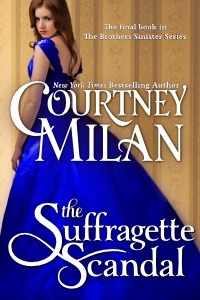 |
| Courtney Milan |
Courtney Milan
2014
The Summary
"Miss Frederica "Free" Marshall has put her heart and soul into her newspaper, known for its outspoken support of women's rights. Naturally, her enemies are intent on destroying her business and silencing her for good. Free refuses to be at the end of her rope...but she needs more rope, and she needs it now.
"Edward Clark's aristocratic family abandoned him to die in a war-torn land, so he survived the only way he could: by becoming a rogue and a first-class forger. When the same family that left him for dead vows to ruin Miss Marshall, he offers his help. So what if he has to lie to her? She's only a pawn to use in his revenge.
"But the irrepressible Miss Marshall soon enchants Edward. By the time he realizes that his cynical heart is hers, it's too late. The only way to thwart her enemies is to reveal his scandalous past...and once the woman he loves realizes how much he's lied to her, he'll lose her forever."
The Good
Free is independent, intelligent, and impetuous. She won't take no for an answer, and she won't back down from a challenge. Edward, on the other hand, is the tall, dark and handsome cliche personified. He's dangerous, more so than anyone realizes, and yet he harbors a genuine affection for Free--and he's willing to risk everything to protect her.
Overall, it's a good story. Free has a lovely sense of humor, and I loved the dynamic between her and Edward. They're misfits in society, who have managed to find one another and do the impossible: fall in love.
It's sweet and amusing, and it does a decent job of rounding out the series to which I've dedicated so much time. Moreover, I was rather excited to see all the characters that I'd come to know and love throughout the series. It was nice seeing everyone again, including Hugo and Serena.
The Bad
I have two complaints about The Suffragette Scandal: one, I didn't like the portrayal of Oliver, Free's brother; two, I didn't like the way that this novel felt like it was tacked on to the end of the series.
Throughout the Brothers Sinister series by Courtney Milan, I've had a certain amount of respect for the male characters. In a way, they have managed to conquer their personal demons and they have made successful lives for themselves, including Oliver. Granted, I know Free has always had a blatant disregard for her brother's reputation and attitudes; however, I was a little bothered by the way Oliver--as well as Sebastian and Robert--were portrayed.
Free seems to think they're all stuffy and archaic, which they might be given her more radical (for the time) tendencies, but Edward just seems to kick them down a notch. Oliver, for instance, seems too stiff and practical in comparison. More to the point, Edward seems to openly mock the camaraderie of the men involved in the "Brothers Sinister."
That is, I've grown to view the "brothers" as a sort of family. They build their relationships out of necessity, attempting to balance out the more damaging influences in their lives. They--Sebastian, Robert, Violet, and Oliver--are all very close for it. I appreciated their humor and I appreciated the lightness their club seemed to provide.
Edward just kind of destroys that feeling, which I really didn't like.
Moreover, I felt like The Suffragette Scandal was just tacked on to the end to give the series some semblance of a conclusion. It brings together a few narrative threads, drawing in all the characters I'd met in the past, but, in my opinion, it doesn't feel quite right. I liked the novel, but I don't think it ended the series on the right note.
Part of this could be that I wasn't as attached to Free as I was, say, Violet or Minerva or even Sebastian. Another aspect is that I was a little bothered by the way this books seems to skip so far into the future, going from 1863 in the The Duchess War to 1877 in The Suffragette Scandal. It seems so far outside the first three novels, almost feeling like a completely different generation.
I think I might have had a bit of a problem reconciling the knowledge that every character I'd grown to know was suddenly growing older...and their stories had officially come to an end.
The Ugly
Edward's past.
It's more than a little painful.
No comments:
Post a Comment